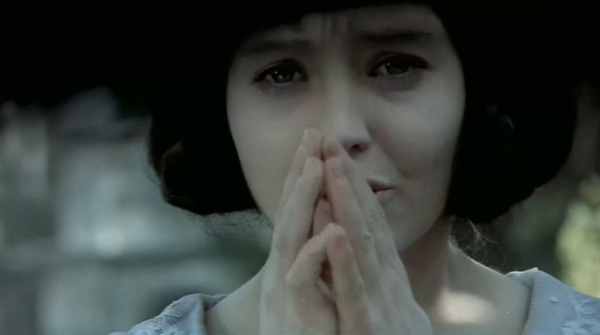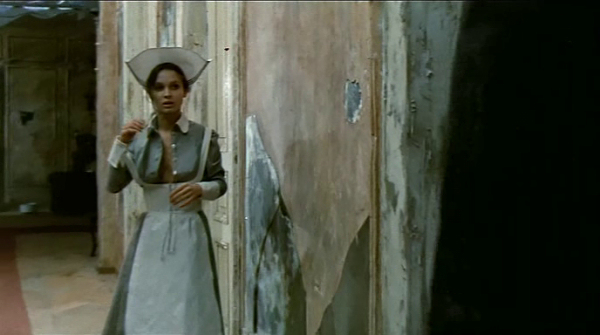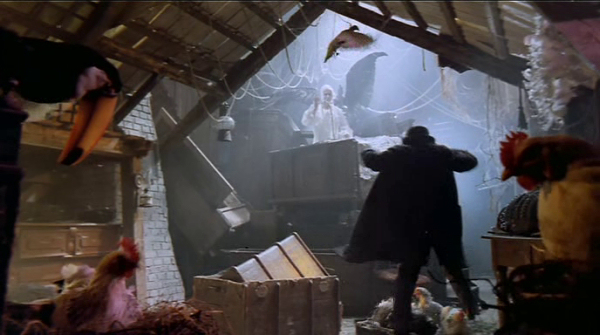
What does a dying man really need escape from? Time? Jakub is dead in his home country but his body is in a place where time endlessly loops and he lives. Or at least, his life occurs, kind of all at once. Or perhaps it's the life of his son. 1973's Sanatorium pod klepsydra (The Hourglass Sanatorium or The Sandglass) is a beautiful, ghoulish, and fascinating film about the human soul stripped bare by an unnatural state of time.
The film begins in a dark train car filled with people who barely seem alive. Several of the women sit with their blouses open. A blind conductor (Mieczyslaw Voit) tells the protagonist, Jozef (Jan Nowicki), that they are nearly arrived at the sanatorium where his father, Jakub (Tadeusz Kondrat), is staying.

Even before reaching the place, things seem dreamlike and fantastic. It's possible everything we see, including his father, are aspects of Jozef's psyche. He finds the sanatorium apparently deserted and crumbling. The first person he meets is a nurse whose blouse is open.

Almost every woman he comes across in the film has exposed breasts and every woman only sometimes seems aware of it as though the breasts are more a reflection of the heterosexual man's thoughts rather than something that occurs external to him.
The nurse tells him everyone sleeps in the sanatorium but she finally takes him to the doctor who shows him what appears to be the corpse of his father.

But as Jozef wanders the house over the course of the film, he does encounter his father apparently alive, occupied with various activities.

Jammed together with their subconscious relationships revealed by the surreal nature of the film are manifestations of death, money, war, race, sex, and government. When Josef encounters a room of dancing Hasidic Jews, he ponders heaven as being the place at the end of the ladder. He and several men in the room climb the ladder to kiss the window of a woman's bedroom, Adela's (Halina Kowalska). She's half naked and pulls a reluctant Jozef into the room, laughing about how she turns men red.

She gives him a fireman's helmet and a pile of newspapers, telling him how she wraps his father's meat in the papers. Jozef later, usually unsuccessfully, tries to convince everyone he meets that the papers hold the "source", the secret to life. He seems to use them as money.

Adela is the sexually mature, lusty woman. Later, Jozef encounters the "infanta", Bianka (Bozena Adamek), who lives in a wax museum and seems to be his idea of appealing female innocence. Though she, too, turns out to be another manifestation of his own lusts, of course.

But she's introduced in a scene where he peeps through a hole in her garden gate and sees her motionless mother in the distance. About her mother, Bianka tells him a story about how she's watched by a perpetual traveller with long legs.

The small opening through which he hears her tell this story perhaps reflects the tiny space through which another person's perceptions and interests can enter Jozef's own crowded reality.
A lot of the movie seems to deal with the difficulty of immigrants dealing with life in a foreign land, perhaps Polish Jews adjusting to life in the U.S. after fleeing during World War II. Jakub talks about how he runs a business out of a stall that would have been beneath his dignity back home but that no-one respects even established merchants here. In one scene, Jozef tries to convince his father that he's mad when Jakub and several other men seem excited to have a tablecloth filled with maggots. An image like that seems to imply a concentration camp. Jakub as both the immigrant and the man in captivity seems perhaps to be an embodiment of an old Poland.

At other times, Jakub tries to instruct a child-like Jozef on the importance of memorising the names of various exotic birds. Meanwhile, Jakub isn't impressed by the papers Jozef got from Adela--there is a continual conflict present between the institutional and the sexual even as one seems to have been created by the other. In this way, the film loops with its themes much as the way time seems to be looped for Jakub or Jozef.


No comments:
Post a Comment